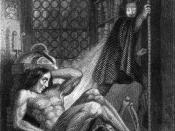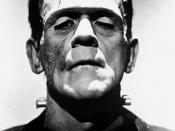It was once said by Helen Keller that, "Science may have found a cure for most evils; but it has found no remedy for the worst of them all - the apathy of human beings." I believe Keller is saying that science is a great thing, but it can not explain why humans act the way they do. Science can have a negative impact. Throughout Mary Shelley's book, "Frankenstein", there are numerous references to science and its uses. Shelley's idea of science is that if it is not used correctly then it can be evil.
Shelley's entire story is about the creation of life. The main character, Victor Frankenstein, brings science and life together. Frankenstein takes God's role of the creation of life and makes it his own science project. He creates a monster. "I had worked hard for nearly two years, for the sole purpose of infusing life into an inanimate body" (Shelly 43).
For two years Frankenstein only focused on his creation and nothing else, science took over his life. This affects both his health and power of reasoning. This is when the reader is first introduced to Shelley's idea that science can be evil when misused.
Frankenstein creates life, but his creation is taking lives. The monster was created in an attempt to demonstrate Frankenstein's great knowledge of science. After the monster's first killing Frankenstein has a chance to do right and tell the truth, but he lets a friend take the blame. His character is then shown by him not being strong enough to face the truth about his wrong it his creation of life. He started his work to show off and become powerful and as a result of his intentions his monster is killing and he is left to live...



Elaborate.
The topic of whether scence is good or evil is quite broad, first of all when you're talking about whether it is good or evil use a real life event instead of a movie. And if you are going to use the movie in your essay at least change the title so that it fits more to what you're writing about. ex. "Science good or evil in Frankenstein."
0 out of 0 people found this comment useful.